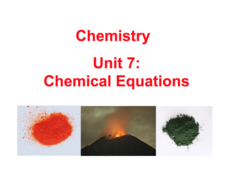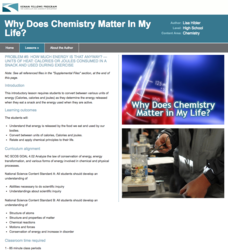Curated OER
High School Mathematics Problems from Alaska: AL-CAN Highway Problem
Students write and solve equations converting between metric and standard measurement as they travel southeast on the Al-Can Highway.
Curated OER
Ideal Gas Law
Pupils explain and use ideal gas law and use the law to solve problems. They use conversion factors to convert mass to mol. Also students use stoichiometry skills previously learned.
Curated OER
Weather for Health
Ninth graders encounter various types of numerical information (represented in multiple ways), much of which is abstract and difficult to comprehend. In this lesson, 9th graders will convert given information into bar graphs. In the...
Curated OER
Conversions at Sea
Learners demonstrate problem solving skills. Students complete word problems requiring unit conversions. They convert both metric and standard units. Learners must determine necessary information to solve problems.
Curated OER
Space Shuttle Statistics
students are the opportunity to enhance their computation skills using real life statistics associated with the Space Shuttle. Skills emphasized include working with fractions, decimals, percents, ratios and proportions, comparing units,...
Curated OER
A Potential Energy Worksheet
In this energy worksheet, students describe the differences between kinetic and potential energy and the difference between heat and temperature. This worksheet has 6 short answer questions.
Curated OER
Fahrenheit vs Celsius
Students make a thermometer and write a paragraph about how they did it.
Curated OER
Que Tiempo Hace Alli?
Hace calor! Use hand signals to accompany weather-related vocabulary. Learners will remember the vocabulary better! They'll then research weather around the world and record it on a chart provided. Add a math component to this plan by...
Curated OER
An Overview of Solar Radiation
Students examine the Stefan-Boltzmann Law. Students compute basic radiative "constants" of the sun-Earth-atomosphere system. They examine the wavelength of maximum radiation emission.
Curated OER
The Absorption of Solar Energy
Two sequential parts to this lesson introduce your class to the electromagnetic spectrum, the ability to absorb radiant energy, and the pigments in leaves that are responsible for collecting sunlight to be used in the photosynthetic...
Texas State Energy Conservation Office
Investigation: Crank It Up!
Following this procedure, eager engineers construct a working model of a piston system, similar to that in an internal combustion engine. Perfect for STEM or automotive technology classes, the activity comes complete with analysis and...
Texas State Energy Conservation Office
Investigation: Blowing in the Wind
Using a simulated air sample, environmental or earth science pupils examine the components. You will need to prepare the faux air by using a hole punch and various colors of construction paper. Each color will represent a different...
Curated OER
It's About Time!
Students examine concept of time, and explore difference between analog and digital clocks; students make art project to represent time and create a time-story problem and solution.
Science Geek
Stoichiometry
Watch your class react when you tell them they're going to study stoichiometry! The lesson demonstrates four examples. Scholars must write and balance the chemical equation and then make the conversion to find the correct mass or volume....
Curated OER
Classification of Matter
This is a great worksheet with an infographic to assist your students in categorizing matter into mixtures and non-mixtures. Information is given about the metric system of measurement. Your young students match 13 terms with their...
Normal Community High School
Chemical Equations
Viewers learn how to identify the substances in a chemical reaction, how to balance it, and the different types of chemical reactions by watching a presentation that also includes a review of monomers and polymers. The presentation...
National Institute of Open Schooling
Spontaneity of Chemical Reactions
Do spontaneous reactions really occur? Activity 12 in a series of 36 focuses on spontaneity of chemical reactions. Learners read about, discuss, and answer questions pertaining to entropy, explain the third law of thermodynamics, explore...
Kenan Fellows
How Much Energy Is That Anyway?
The fifth lesson in the six part series introduces units of energy including calories, Calories, and joules. Scholars determine the energy released when eating a snack and during activity.
Curated OER
Version 001 - Quiz 1
The phase diagram tops this chemistry quiz. Junior scientists answer eight multiple-choice questions as they analyze it and make calculations regarding the heat of vaporization.
Exploratorium
The Dipping Bird
If you have or want to order the dipping bird demonstration, it is useful for showing how evaporation and changes in the pressure of a closed system cause cyclical motion. After teaching about pressure, consider setting this little guy...
Chicago Botanic Garden
Weather or Not
What is the difference between weather and climate? This is the focus question of a activity that takes a deeper look at how weather data helps determine climate in a region. Using weather and climate cards, students decide...
Curated OER
Using Graphs
Print and use this useful unit on basic algebraic functions, domain, range, and graphing. Tasks include, illustrating simple functions with a graph, and identifying the domain and range of the function. This twelve-page packet contains...
Santa Monica College
Single and Double Displacement Reactions
If you aren't part of the solution, you are part of the precipitate! Young chemists learn about single and double displacement reactions including precipitation reactions, neutralization reactions, and gas forming reactions. They perform...
University of Southern California
Mastering Microbes
Small but mighty! Learners explore the role of microbes in a healthy ecosystem. An engaging lesson asks pupils to design an aquaponics system that demonstrates that healthy microbes are necessary to maintain the ecosystem.

























